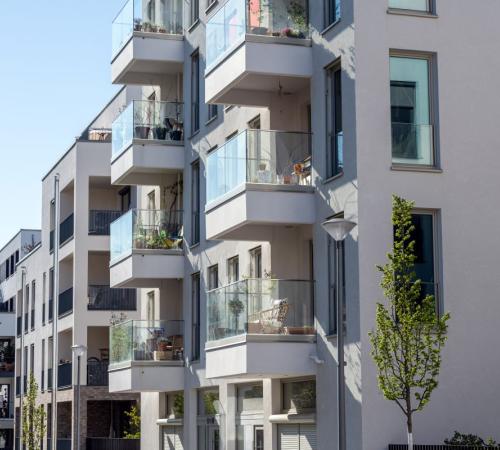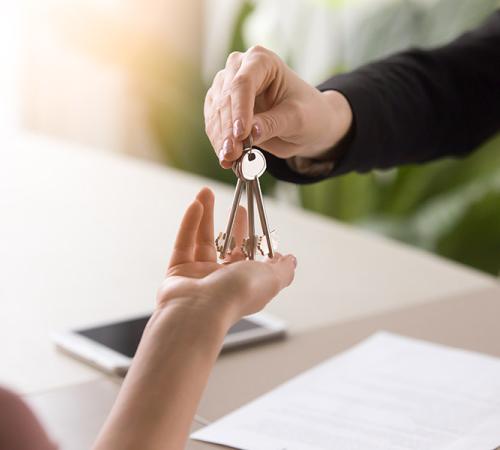

So, what steps must landlords take to gain access? What are the valid reasons for needing entry? And what rights do tenants have in these situations?
Landlords occasionally need to access their rental properties. However, it's not as straightforward as showing up and entering. Legal regulations (external link) restrict landlords from accessing the property without the tenant's consent.
So, what steps must landlords take to gain access? What are the valid reasons for needing entry? And what rights do tenants have in these situations?
Disclaimer:
Managing rental properties is a complex business. At Hiscox, we want to see your investments thrive. Our articles offer insights into property management and landlord best practices. But these articles aren't professional advice. To find out more about a subject we cover here, please seek professional advice.
What are access rights?
Landlord access rights allow landlords to enter their rental property for reasons such as inspections or repairs. However, they must obtain tenant consent beforehand. Entering without permission is considered trespassing and violates the tenancy agreement.1
Reasons for landlord access
There are many legitimate reasons why a landlord may need to access their property:
- Safety inspections: Landlords must conduct various safety inspections (external link) on UK rental properties. The primary one is the annual Gas Safety inspection. Additionally, they may need access for an electrical inspection (external link) (required every five years) or an energy performance assessment (external link) (required every ten years).
- Mid-term inspections: Landlords can request access to inspect a property's condition, provided these inspections are not too frequent. Typically, these occur every three to six months, depending on the tenancy length.
- Repairs: If an inspection reveals issues that need fixing, or if a tenant reports a fault, the landlord may request access to carry out repairs, either personally or through a professional. Landlords are obliged to maintain and repair the structure and installations for the water supply and heating under Section 11 of the Landlord and Tenant Act 1985 (external link)2 (external link).
- Viewings: Towards the end of a tenancy, a landlord may request access to show the property to potential new tenants. The tenancy agreement may specify a period towards the end of the tenancy during which the landlord can enter for viewings at reasonable times with sufficient notice. Landlords should act considerately, especially if the tenant has been served notice. The process may be smoother if the landlord and tenant agree on appropriate viewing times.
- Emergencies: This is the only situation where landlords can enter without permission. If there is a threat to the property's structure (e.g. fire or structural damage) or a threat to life (e.g. a possible criminal incident), a landlord can enter as long as they act reasonably.3 (external link)
Notice requirements
Regardless of the reason for accessing a property, landlords must provide their tenants with written notice at least 24 hours in advance, as per the Housing Act 19884. (external link) This notice can be delivered via text message, email or a physical letter and should include specific dates and times. The tenant must then give permission, and they are within their rights to ask for a more convenient time if it doesn’t suit them.
Landlords are not permitted to include clauses in a tenancy agreement that allow them to enter the property at any time without notice. However, they can specify the frequency of visits or the required notice period before each visit.
Tenant rights and privacy
Tenants have the right to live in their rented property without interference from their landlord, a principle known as "quiet enjoyment."5 (external link) This doesn't mean landlords can't access the property at all, but they must notify the tenant and obtain approval beforehand.
It's crucial for landlords to respect their tenants' privacy and request access in a legal manner. Tenants can refuse access if they haven't received written notice and can report unauthorised entries to local authorities. Persistent unauthorised access can lead to landlords being charged with harassment under the Housing Act 1988 (external link), facing fines and receiving court orders to stop entering the property.
Best practices for landlord access
Maintaining a positive relationship with tenants can significantly ease the process of landlord access. Here are some best practices that landlords can consider:
- Always request access: If you need to enter the property, always inform the tenant and agree on a convenient time
- Communicate clearly: Open and clear communication with your tenant is crucial when you need access
- Adhere to legal requirements: Ensure you comply with all legal standards when requesting access to a rental property
- Keep records: Documenting your access requests and agreements can be helpful in case of future disputes.
You can find more information in GOV.UK’s guide to letting (external link).
References
- https://www.legislation.gov.uk/ukpga/1988/50/contents
- https://england.shelter.org.uk/professional_resources/legal/housing_conditions/responsibility_for_repairs/repairs_under_section_11
- https://www.legislation.gov.uk/ukpga/1988/50/contents
- https://www.legislation.gov.uk/ukpga/1988/50/contents
- https://www.legislation.gov.uk/ukpga/1988/50/contents






